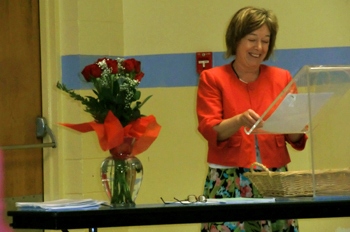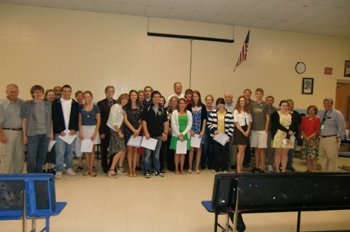International Baccalaureate Program at Kennebunk High School
Kennebunk High School’s graduating class of 2010 has a unique distinction: eleven of its seniors are candidates to receive International Baccalaureate Diplomas, and forty-eight are candidates for IB Certificates. Both groups will be the first such graduates in Maine. It’s an honor they have toiled for in a program that embodies the rigors of AP courses and adds a level of inquiry and international-mindedness not normally experienced in U.S. schools.
“They’ve learned to think and to question, to learn how to learn,” says Susan Cressey, IB program facilitator at KHS. “IB is a full program. It forces you to take courses in your strengths but those you’re not as strong in, too.” Cressey says that both she and her IB students appreciate the depth of discovery they feel IB brings to their studies.
EFKA founder Ted Damon is another supporter of the IB program. “The kids are not trained to memorize but to investigate and analyze and inquire,” says Damon. “It’s more hands-on, real world experience.”
“It’s not for every kid,” says Phillip Hussey, IB Certificate candidate. “It’s for people who like to question things. It’s a style of learning.”
“You have options and pick what you want to do,” says Aisling Rice, IB Diploma candidate. “It’s a lot of student based work. It’s really about you learning, not just learning from a book.”
“I like how IB is discussion based,” says Alienor Leon, IB Diploma candidate. “It uses more thinking and skills, not just facts.”
KHS became an IB Diploma and Certificate school in the Fall of 2008. During their junior and senior years, IB Diploma students are required to take six core courses in Languages, Experimental Sciences, Math, Art, and Individuals and Societies. They also discover what type of learner they are in a Theory of Knowledge class. A Social Service project requiring 150 hours of commitment and a 4,000-word essay on a global topic of their choice are also part of the curriculum. Students who take one or more of the core courses but not the entire program can earn an IB Certificate.
Challenging facts and assertions is central to IB. It’s critical thinking that motivates IB students like those in Brent Sirois’ Physics class, who spent the year exploring the topics of energy, power, and climate change. After hours of data manipulation and experimentation, Sirois’ students concluded that solar panels, like the one installed in front of KHS, may not be the solution to the nation’s dependence on oil, even though green energy seems so attractive.
“They’re able to look at the solar panel and see it has ability, but
Nick Cabral, IB Certificate candidate, notes other benefits he has experienced. “It’s really grasped my interest to be able to chart the system, take the data from the panel and see actual information,” he says. “It’s a skill to take with us to the job market.”
But these students are first-of-all college-bound, and they will tell you that having IB credentials is a flag that gets one attention at one’s schools of choice.
“My transcripts got me into top schools,” says Erin Beal, IB Diploma candidate. “It’s [IB] so stressful. But going to college I feel so prepared.”
“Right now, I know you’re ready for college,” Cressey says to her
Confidence in IB was something students, their parents, and even teachers had to build in a program that had no track record in Maine. Clearly,
“It was risky but we were grateful to have the opportunity to take IB,” says Catherine Leon, parent of IB Diploma candidate Allie Leon. “The top colleges she applied to, IB resonated with them.” Leon will attend Wesleyan University in the fall.
Mary Rice, parent of IB Diploma candidate Aisling Rice, agrees that it was a risky move. “She went out on a limb,” Rice says, but she is impressed with the results. Her daughter, who will attend Rensselaer Polytechnic Institute, won a substantial leadership award that she attributes to Aisling’s taking on IB.
Rice also says that she has encountered skeptics of IB in the community and wishes more students and educators would embrace it. While the IB program is not well known in Maine, there are more than two thousand IB schools
Rice and Leon also believe that the IB teachers at KHS need more development and support to bring the IB curriculum to its full potential. Cressey and other IB teachers feel the pressure to learn the new teaching style, and more IB training is to come. Cressey says that when student essays are sent to outside experts at IB headquarters for grading, she feels she is being graded just like her students.
“It [IB] provides teacher evaluation as wellhow students
Cressey attended her first IB conference in June of 2006. The Education Foundation of the Kennebunks and Arundel, understanding budget constraints in the district, provided $30,000 to fund teacher training and curriculum development. Corning also made contributions, allowing even more teachers to participate. Because graduates with IB credentials are attractive to businesses with overseas operations, Cressey is hoping to win more grants and business support to further training.
The eleven IB Diploma and forty-eight IB Certificate students will receive their final grades from the International Baccalaureate Organization on July 5th. IB candidates did receive diplomas when they marched with their peers at KHS on June 6; however, another ceremony to present their IB diplomas and certificates will be held in December.

